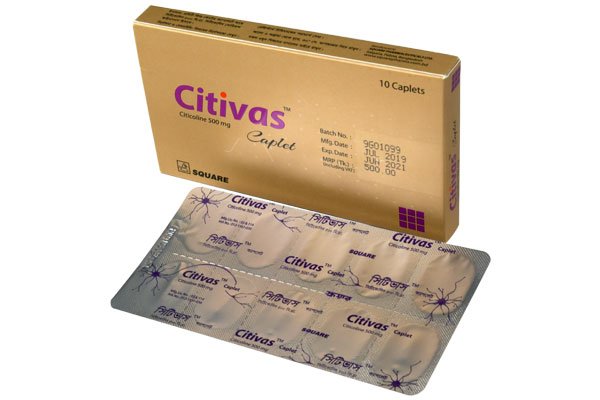Citivas Caplet
500.00৳ Box
Citivas, a neurological medication, tackles conditions like stroke aftermath, cognitive decline, and Parkinson’s disease. Its active ingredient, Citicoline, aids in membrane repair and neurotransmitter elevation. Administered orally or via injection, Citivas enhances recovery and cognitive function, yet watch for side effects like dizziness. Safely stored below 30°C, it’s contraindicated in parasympathetic hypertonia.
 Brand
Brand
|
Square Pharmaceuticals PLC |
|---|---|
 Generics
Generics
|
Citicoline Sodium |
Indications
Citivas is prescribed for the following conditions:
- Cerebrovascular Disease: Citivas aids in the management of cerebrovascular conditions, such as ischemia resulting from stroke. It facilitates the acceleration of consciousness recovery and the alleviation of motor deficits. Early treatment within 24 hours of moderate to severe stroke onset notably enhances the likelihood of complete recovery within three months.
- Cerebral Insufficiency: Symptoms like dizziness, memory impairment, reduced concentration, and disorientation stemming from head trauma or brain injury can be addressed with Citivas.
- Cognitive Dysfunction: Citivas is beneficial in managing cognitive impairments associated with degenerative diseases like Alzheimer’s disease.
- Parkinson’s Disease: Citivas demonstrates efficacy as a co-therapy for Parkinson’s disease, aiding in symptom management.
Pharmacology
Citicoline, a naturally occurring substance, plays a crucial role in synthesizing structural phospholipids within cell membranes. Upon oral administration, Citicoline undergoes metabolism to choline and cytidine. These metabolites enter systemic circulation, traverse the blood-brain barrier, and recombine, forming Citicoline within the central nervous system. Citicoline’s actions include:
- Activation of biosynthesis of structural phospholipids in neuronal membranes.
- Facilitation of rapid repair of injured cell surfaces and mitochondrial membranes.
- Elevation of levels of various neurotransmitters like acetylcholine and dopamine.
- Exhibiting neuroprotective effects in situations of hypoxia and ischemia.
- Improving learning and memory performance in animal models of aging brains.
- Inhibition of Phospholipase A2 activation, thus preventing apoptotic and necrotic cell death.
Dosage & Administration
Oral:
- Immediate Treatment of Ischemic Stroke: Administer 500-2000 mg of Citicoline per day, initiating within 24 hours of stroke onset caused by a clot.
- Management of Decline in Cognitive Skills Post-Stroke: Prescribe 1000-2000 mg of Citicoline per day.
- Chronic Cerebrovascular Disease: For ongoing blood vessel disease affecting the brain, prescribe 1000 mg daily in divided doses, to be taken with or between meals.
Injection:
- Frequency: Recommend 1 to 2 injections daily.
- Dosage Adjustment: Adjust dosage according to the severity of the condition.
- Administration Routes: Citicoline injections can be administered via intramuscular (IM) or intravenous (IV) routes, with IV administration typically taking 3 to 5 minutes.
Geriatric Use:
- Dosage Adjustment: No dosage adjustment is necessary for geriatric patients. The usual dose can be administered.
Interaction
Citivas may potentiate the effects of levodopa, carbidopa, and entacapone. Avoid concurrent administration with products containing meclophenoxate.
Contraindications
Citivas should not be administered to patients with hypertonia of the parasympathetic nervous system.
Side Effects
Occasionally, Citivas may induce stimulating effects on the parasympathetic system and transient hypotension.
Pregnancy & Lactation
Limited and controlled studies regarding Citicoline’s safety during pregnancy and lactation are unavailable. Use during these periods should only occur if the potential benefits outweigh the potential risks.
Precautions & Warnings
- Citivas may increase dizziness or drowsiness; patients are advised against operating machinery during treatment.
- Hypotension may occur, and if necessary, it can be managed with corticosteroids or sympathomimetics.
- In cases of persistent intracranial hemorrhage, administer Citivas very slowly (30 drops/minute) to prevent a sudden increase in cerebral blood flow.
- Avoid alcohol consumption while taking Citivas.
Therapeutic Class
Citicoline belongs to the therapeutic class of CNS stimulant drugs.
Storage Conditions
Store Citivas below 30°C, away from light and moisture, and out of children’s reach.













Reviews
There are no reviews yet.